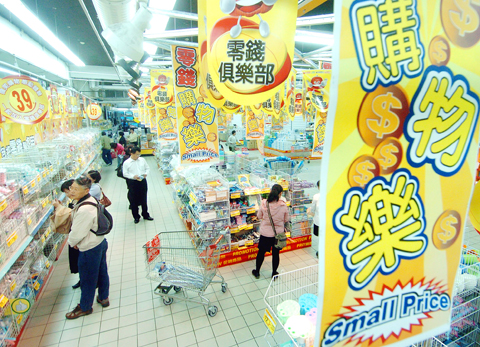The planned distribution of shopping vouchers would help boost retailers and other service sectors, but more stimulus measures are needed to lift domestic demand amid the looming global recession, economists said yesterday.
In another bid to mitigate the effect of external financial shock, Premier Liu Chao-shiuan (劉兆玄) unveiled details yesterday afternoon of a plan to give out shopping vouchers valued at NT$3,600 (US$108.32) to all citizens to help businesses weather the economic downturn.
The measure, intended to raise GDP growth by 0.64 percentage points next year using NT$82.9 billion (US$2.5 billion) in special funding, came two days before the state statistics agency is scheduled to update major economic pointers.

PHOTO: CHANG CHIA-MING, TAIPEI TIMES
Liang Kuo-yuan (梁國源), president of Polaris Research Institute (寶華綜合經濟研究院), said that the policy could trigger a positive business cycle as increasing consumer spending would boost domestic demand.
However, Liang said it was too early to gauge its full impact.
“With consumers spending more, industries will supply more goods and services,” Liang said. “The trend may spell more employment opportunities and increase personal disposable income.”
The timing of the distribution will play a crucial role in the policy’s effectiveness, the academic said, suggesting that the government carefully consult the economic indicators to be released tomorrow.
“The vouchers would have less effect if they were distributed when people have just received their pay or as GDP hits a new low,” Liang said. “The longer the distribution takes, the weaker its impact on the economy will be.”
The Cabinet still needs to obtain approval from the legislature before it can distribute the vouchers.
Liang said that more stimulus measures would be necessary if the nation’s economic situation turns out to be worse than expected.
The government is set to lower next year’s GDP growth forecast, with all major trading partners, except China, expected to post negative growth.
Chen Miao (陳淼), a research fellow at the Taiwan Institute of Economic Research (台經院), said domestic service providers may breathe a long-awaited sigh of relief once the policy is put into practice.
The sectors have suffered falling profit margins on surging raw material costs and slumping consumer spending, Chen said.
But Chen said it remained to be seen if the plan would turn out a burden on the national treasury, with the government already promising a spate of tax cuts and outlays.
Christina Liu (劉憶如), the top adviser at Daiwa Institute of Research Co, said the stimulus measure would be good for domestic consumption and economic growth, but that the government should take steps to prevent forgery and other problems to maximize its impact.
To that end, Liu said it made more sense for the government to give the vouchers to individuals rather than households whose sizes vary.
“It would not be fair for singles to receive the same amount as families with children,” Liu said.
The Cabinet originally intended to distribute the vouchers to all individual households with an annual income of NT$1.2 million and below, but policymakers argued the restriction would have turned the plan into a welfare subsidy rather than an economic stimulus.
“There is no need to exclude the rich from the measure as they pay their share of taxes,” Liu said.

Intel Corp chief executive officer Lip-Bu Tan (陳立武) is expected to meet with Taiwanese suppliers next month in conjunction with the opening of the Computex Taipei trade show, supply chain sources said on Monday. The visit, the first for Tan to Taiwan since assuming his new post last month, would be aimed at enhancing Intel’s ties with suppliers in Taiwan as he attempts to help turn around the struggling US chipmaker, the sources said. Tan is to hold a banquet to celebrate Intel’s 40-year presence in Taiwan before Computex opens on May 20 and invite dozens of Taiwanese suppliers to exchange views

Application-specific integrated circuit designer Faraday Technology Corp (智原) yesterday said that although revenue this quarter would decline 30 percent from last quarter, it retained its full-year forecast of revenue growth of 100 percent. The company attributed the quarterly drop to a slowdown in customers’ production of chips using Faraday’s advanced packaging technology. The company is still confident about its revenue growth this year, given its strong “design-win” — or the projects it won to help customers design their chips, Faraday president Steve Wang (王國雍) told an online earnings conference. “The design-win this year is better than we expected. We believe we will win

Chizuko Kimura has become the first female sushi chef in the world to win a Michelin star, fulfilling a promise she made to her dying husband to continue his legacy. The 54-year-old Japanese chef regained the Michelin star her late husband, Shunei Kimura, won three years ago for their Sushi Shunei restaurant in Paris. For Shunei Kimura, the star was a dream come true. However, the joy was short-lived. He died from cancer just three months later in June 2022. He was 65. The following year, the restaurant in the heart of Montmartre lost its star rating. Chizuko Kimura insisted that the new star is still down

While China’s leaders use their economic and political might to fight US President Donald Trump’s trade war “to the end,” its army of social media soldiers are embarking on a more humorous campaign online. Trump’s tariff blitz has seen Washington and Beijing impose eye-watering duties on imports from the other, fanning a standoff between the economic superpowers that has sparked global recession fears and sent markets into a tailspin. Trump says his policy is a response to years of being “ripped off” by other countries and aims to bring manufacturing to the US, forcing companies to employ US workers. However, China’s online warriors